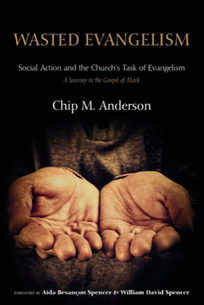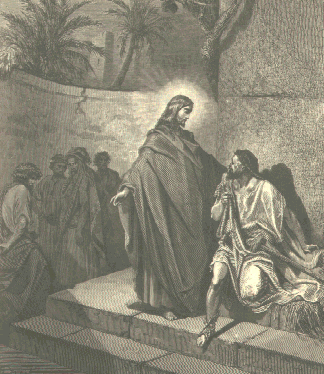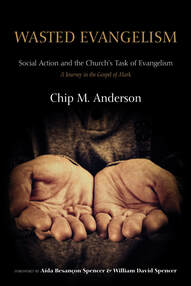 Significance: Determine Analogous Obedience The narrative and programmatic significance of both “preaching” and “casting” indicate that the content of the to preach(v. 14c) component of the Mark 3 commission is the authority to cast out the demons (v. 15). This is grammatically and syntactically allowable and is affirmed by how Mark crafted his narrative. Reading the commission in this way challenges a narrowly defined, verbal- and cognitive-based understanding of evangelistic activities. As fisher-followers, the church’s paradigm for evangelism is found in the Mark 3 commission, which indicates that Christians and the Christian community should include evangelistic activities that confront Satan’s dominion over the realms of humankind and that reorient those realms to reflect the inaugural presence of God’s kingdom. Thus, the task of “casting” corresponds to any analogous obedience (i.e., application) that confronts what is contrary to God’s design for living in the land[1] and that demonstrates how God’s rule affects the realms of humankind. In order to move appropriately from text to application, there should be a correspondence between the meaning of the text, its significance to the readers/listeners, and the action taken that indicates obedience to the text. For the church in front of the text, the significance of the Mark 3 commission is our alignment with and commitment to the mission of Jesus (1:14–15) and to exercise Jesus’ authority through actions that demonstrate, concretely and evidentially, that God’s rule and reign has entered time and space. Certainly, as the whole of the NT indicates, evangelism includes proclamation (i.e., verbal- and cognitive-based activities of communication) that presents the information of the Good News, announcing and explaining that the kingdom is near. Yet, such proclamation is not the end of evangelism. Mark’s Gospel narrative as a whole and the Mark 3 commission specifically indicate there is also to be a resultant consequence of the “preaching,” another viable mode of language, namely the doing of deed-parables. As parables revealed the mysteries of the kingdom, deed-parables evidence (i.e., have outcomes that indicate) the undoing of Satan’s power over the affairs of humankind (Mark 3:27) and, as a result, seek to reorient people and the world back toward God’s rightful dominion (an underlying significance of the Mark 4 parable of the mustard seed, vv. 30–32).[2] Evangelism is the spread of the gospel, the seed sown (Mark 4), which according to Mark’s narrative is dynamically linked to the end of Satan’s dominion and the inauguration of God’s rule and reign. This is what biblical evangelism looks like: as Jesus’ “casting” action demonstrated the end of the strongman-Satan’s kingdom and the arrival of God’s kingdom—visible and evidential acts that indicate the time has been fulfilled and the kingdom of God has come near (1:15a, author’s translation)—so, for the church seeking to obey this text, the significance of the “casting” component of the Mark 3 commission is the continuation of Jesus’ mission to confront the powers that oppose God’s dominion. Therefore, as indicated by the fisher-promise’s association to OT contexts that include the issues of poverty and, as well, the implications of the Mark 12 poor widow episode (12:38–44), applications for “casting” should include advocating for those affected by poverty.[3] Separating social action from evangelism is an unwarranted dualism As I demonstrated in chapter 3 (“You Will Appear as Fishers”), the Mark 3 commission is the inaugural fulfillment and premiere application of the Mark 1:17 fisher-promise. The fisher role is related to God’s judgment and action toward people and structures that distort God’s creation from his design and reign over it, which includes advocacy for those affected by the issues of poverty and injustice. This allows evangelism, that is, the sowing of the word/gospel to also include the realm of social action, which demonstrates God’s rule and dominion over the realms of society and people that impact the poor and economically vulnerable. This is supported by antecedent OT material related to the economically vulnerable that is associated with the judgment role of fisher-followers.[4] This implies that the Mark 3 commission (3:14–15), to some extent, should be associated at the application level with social action, which is legitimate obedience for following Jesus Christ and for being faithful to the gospel. Therefore, obedience to the Mark 3 commission includes “applications, activities, and outcomes of social action and justice”[x-ref] that should be an intentional component of a church’s or Christian community’s evangelistic activities, which is, at least in part, the fisher-follower’s task. The obedience (i.e., application) and the desired outcomes analogous to the purpose and intent of the commission to have authority to cast are those which demonstrate God’s reign and rule. Separating social action from evangelism is an unwarranted dualism that is alien to the gospel as Mark presents it in his narrative and, as well, to the wider biblical record. As proclaiming the kingdom’s arrival was demonstrated by Jesus’ deed-parables (i.e., castings, healings, miracles), the evangelistic task of the church is to include analogous activities that indicate the presence of God’s rule and reign. This also makes redemptive-historical sense of the authority to cast out the demons (Mark 3:15) as a display of the all-encompassing arrival of God’s kingdom: God in Jesus Christ has reconciled all things to Himself (Col 1:20) and with a view to an administration suitable to the fullness of the times, that is, the summing up of all things in Christ, things in the heavens and things on the earth (Eph 1:10). Social action that reflects God’s design for living in the land—social action, that is, that demonstrates his reign and his righteousness that is to be expressed among people—is the responsibility of faithful fisher-followers of Jesus, God’s Messiah-King. Consequently, evangelistic activities of the church ought to seek to ensure that the economically vulnerable and the poor (i.e., the land-less) are full participants in the benefits of living in the land. In other words, as Mark’s narrative richly portrays the gospel of Jesus Christ (Mark 1:1), social action outcomes should be included as a component of a church’s task of evangelism. [1] The concept of “living in the land” is borrowed from Walter Brueggemann (The Land), who uses the terminology to refer how the Israelites were to live in the land of promise as neighbors, where everyone is to benefit from living in the land; the land-laws and covenant-stipulations governed how they were to live “in the land” together, specifically being mindful of the economically vulnerable and the poor. Although I am using it in a contemporary sense—Americans living in America—I am borrowing the idea that everyone, the rich, the poor, the middle class, all neighbors to some extent are “living in the land.” [2] Note the final discussion on this parable (i.e., the mustard bush) in chapter 2, “Wasted Evangelism.” [3] Refer back to chapter 1, “Widows in Our Courts,” for a biblical illustration how both people and systems can cause others to live with the effectsof poverty; additionally, review the OT texts that juxtapose idolatry with poverty in chapter 5 (“Idolatry and Poverty”). [4] This is the argument of chapter 3, “You will Appear as Fishers.”
0 Comments
 Rereading the Mark 3 commission text Three main verbs related to Jesus govern the establishment of the twelve whom he commissioned: he went up(avabainei, v. 13a), he summoned (proskaleitai, v. 13b), and he created (epoiesen, v 14a). The force and combination of all three verbal expressions stress Jesus’ authority, which aligns with Mark’s narrative plotline.[1] Additionally, these actions focus on his unique authority for establishing God’s kingdom through a ministry outside of Jewish temple leadership (i.e., a new Moses and a new exodus) and for the creation of a people (a new twelve, 3:13–19; a new family, 3:33–35), who are to reflect the kingdom-outcomes associated with his appearance. These elements have been the emphasis of the plot (i.e., the “sequence of events emplotted in the text”) so far, indicating that Mark continues to follow his established programmatic content that defines the nature of the gospel. The Mark 3 commission (vv.14–15) for the created twelve not only forms (and informs) their fisher-ministry (i.e., the application that will reflect their faithful obedience to the gospel), it also provides a paradigm for all fisher-followers; namely, those who believe in the gospel (1:14–15) and follow after Jesus (1:17) are those who demonstrate (through actions and outcomes) the inauguration of God’s kingdom. A typical reading of Mark 3:14–15 understands that the twelve are commissioned for two distinct tasks: “to preach” and “to cast out demons.” This heightens the tendency to view the “to preach” component as solely the verbal proclamation of the Good News that Jesus died for our sins. Although a very important component of the Good News, this aspect of the gospel is appropriated from other NT documents and texts and, then, “applied” here. As a result, for many “preaching” is “evangelism” that is applied as various verbal- and cognitive-based activities (e.g., preaching, teaching, witnessing, etc.) about the personal, redemptive implications of Jesus’ death on the cross with someone’s conversion as the hopeful outcome. When the text is viewed in this way, application is separated into two distinct components that disconnect the Mark 3 commission from the narrative plot. A reading that separates the two components without syntactical or narrative consideration can limit the inferred evangelistic significance for those standing on this side of Mark’s Gospel story, which, then, can result in narrow, misdirected, and, even, non-authoritative application. However, the Mark 3 commission suggests, not two distinct tasks, but interrelated aspects that are associated with the sequence of events emplotted in Mark’s narrative. A re-examination of the commission text (specifically vv. 14–15) will show another potential reading that better aligns with Mark’s narrative, the programmatic nature of the gospel, and Jesus’ kingdom-inaugurating ministry. A syntactical analysis[2] of Mark 3:14–15 can aid in reading the text more effectively: And he [Jesus] created twelve (epoiesen dodeka), so that (hina) they would be with him and (kai, conjunction) so that (hina) he would send them forth to preach (kepyssein) namely (that is) (kai, epexegetical) to have authority to cast out (echein exousian ekballein) the demons. This display of syntactical relationships helps to visualize how Mark crafted the commission together, offering a potentially different, yet legitimate, reading of the commission. My translation below reflects the syntactical relationship between the two components to preach and to have authority to cast And he [Jesus] created twelve, so that they would be with him and so that he would send them forth to preach, namely (that is) to have authority to cast out the demons [author’s translation].[3] In contrast to the typically understood cognitive-based definition for evangelism, this reading of the commission, which the text allows, suggests a different direction regarding its significance for fisher-followers on this side of the text. As a result, it opens a wider range for potentially relevant and appropriate evangelistic activities and outcomes that should be adopted by the church. After “summoning” those whom He Himself wanted (v. 13b), Jesus created twelve (v. 14a) so that they (i.e., the created twelve) would be with Him (v. 14b) and so that he would send them forth with a commission (v. 14c–15). The two hina (so that) clauses indicate two resulting purposes that align with Mark’s narrative.[4] The first hina clause (so that they would be with him, v. 14b) suggests an intentional relationship between Jesus and the created twelve. Certainly being “with Him” has many implications and means more than just “tagging along with Jesus.” While “being with Jesus” is set in motion at the initial calls in Mark’s first chapter (see vv. 16–20), the results are given content (definition) throughout the narrative before Jesus actually grants the twelve the authority to cast in 6:7. At the narrative level being “with Him” (3:14b) means that the created fisher-followers are insiders who do “the will of God” (3:35), who receive direct teaching and insight concerning the kingdom (4:10–11), and who witness his divine power (4:35–41) and the inaugural increase of God’s kingdom (5:1—6:6). Additionally, the twelve fisher-followers, who were created to be with Him (3:14b), experienced the spread of the seed/word/gospel, not solely through verbal- and cognitive-based activities (e.g., Jesus’ preaching, teaching, parables), but primarily through Jesus’ deeds (e.g., casting, healing, and other miracles).[5] The created twelve are also “sent forth” to preach (v. 14c) and to have authority to cast (v. 15). It should be noted there is no object (i.e., the content) for the “preaching” component (v. 14c). This provokes many to supply “the gospel” for what is preached. It is fair, perhaps, to suggest supplying the unwritten “Good News,” but it is unnecessary. An assumption is made of the text, namely that the “and” (kai) between the two infinitive clauses functions as a simple conjunction, inferring, then, two distinct tasks: preaching and casting. This, too, is not necessary. Also, note that the commission component after the “and” (kai) is actually, not “to cast out the demons,” but to have authority to cast out the demons (v. 15). The syntactical analysis displayed above indicates that the conjunction “and” (kai) should be understood epexegetically, that is, offering a fuller explanation and the content of to preach. I have, therefore, rendered the “and” (kai) as “namely (that is)”: so that he would send them [the created twelve] forth to preach, namely (that is) to have authority to cast out the demons. In other words, the content of the “preaching” is the authority to cast out the demons. [1] See chapter 4, “A Prelude to Judgment,” for a discussion regarding the centrality of Jesus’ authority in the Mark 1:21—3:6 conflict thread, which is an integral part of Mark’s plotline. [2] A syntactical analysis helps to show how the parts of grammar relate to each other, indicating the relationships of subjects, main verbs, direct and indirect objects, and subordinate and explanatory clauses. The syntactical analysis here informs and reflects the author’s translation of the text. See Kaiser, Toward an Exegetical Theology (pp. 87–104) for an explanation of the syntactical analysis as a component of exegesis. [3] The following references to Mark 3:14–15 reflect my translation. [4] Hina (so that) may express purpose, result, or content depending on the context. In a few cases it may even express other (related) relationships such as an imperative or a generic-specific relationship. I have chosen “resulting purpose” intentionally to indicate a fine line between the two. Jesus creates twelve for a purpose that results in “being with him” and “being sent forth.” See Arndt and Gingrich, Greek-English Lexicon, 376–78. [5] See Mark 1:21—6:6.
 Pay Attention to Significance—Think Deeply About Application Walter Kaiser reminds us, “Exegesis is never an end in itself.”[1] In Toward an Exegetical Theology, he rightly points out that the ultimate purpose of exegesis is “never fully realized until it begins to take into account the problems of transferring what has been learned from the text over to the waiting Church.”[2] Obedience to the biblical text is essential to the Christian life and is, as well, defining for the life of the church. This should be the goal of the mindful Christian and what faithful leadership should intentionally foster in a church community (Mark 3:35). This is why developing appropriate, not just “relevant,” application is important. Yet, applying the Bible can offer its own set of problems and difficulties. If we move too quickly to application, it is quite possible to miss the obedience implied by the text (any text for that matter) and, as well, the gospel. Before examining the Mark 3 commission, specifically vv. 14–15, it is worth considering the problem of application. The problem of application In their book, How to Read the Bible for All Its Worth, Gordon Fee and Douglas Stuart point out that many Christians start with “the here and now” and “read into texts meanings that were not originally there.” They rightly affirm that Christians “want to know what the Bible means for us,” and “legitimately so.” However, we cannot make the Bible or the gospel or any text for that matter “mean anything that pleases us and then give the Holy Spirit ‘credit’ for it.”[3] Fee and Stuart hit the mark as it relates to the problem of interpretation: the step of good study and exegesis to decipher the original author’s intention is too often skipped or undertaken lightly, with readers/listeners jumping straight-away to “the here and now.” This actually confuses interpretation with application. Although Fee and Stuart’s point concerns interpretation of the text, the same problem occurs when the “here and now” of contemporary application is read back into the text. We cannot make any application we want from any text, give the Holy Spirit credit, and then call it obedience. Application can often be read into a text, again, confusing interpretation with application. A fixation on the practical does not inevitably lead to obedience of the biblical text. In view of these present set of studies, application, as evangelism is typically understood, might not necessarily indicate faithfulness to the gospel of Jesus Christ (Mark 1:1). This can be a problem with application—that is, application is not always obedience. Moving from meaning to significance, then to application Understanding what the biblical author (in this case, Mark) meant is certainly the first step necessary for seeking faithful obedience to the gospel of Jesus Christ (1:1). The previous five chapters have sought to do just that. Yet, bridging the gap from the then to the now demands thoughtful attention. In order to think more deeply and thoroughly about application, three basic steps are essential to the process:
Meaning is that which is represented by the text, that is, what the biblical author intended by the words, syntactical and contextual relationships, and use of antecedent biblical material and contexts. Significance establishes the relationship between the original meaning and the person, persons, place, or situation (or “anything imaginable”) on this side of the text.[4] The meaning of the text does not change, but its significance to those on this side of the text (who, when, where, etc.) does change and can be relevant in different ways.[5] Application, on the other hand, is the least rigid of the three elements for determining faithfulness to the gospel and can take multiple forms to reflect obedience. Still, application needs to flow from significance and be an appropriate action that reflects the obedience implied by the text (e.g., the Mark 3 commission) or biblical concept (e.g., the gospel). For example, the meaning of the Mark 3 commission is determined by exegesis (an analysis of the text and surrounding narrative). The significance of that meaning is deciphered by the text’s relationship and its implications to those on this side the text. In other words the reader/listener should ask, What is the significance of the Mark 3 commission to me, to my church, and to the community where I live? Application, then, is the appropriate and analogous actions, behaviors, and/or attitudes that produce or indicate faithful obedience to the text. If Mark intended his audience to understand that those who follow after Jesus will be created fishers of men who have a role in inaugurating the kingdom that has arrived in the appearance of God’s Messiah-King (1:1, 14–15, 17),[6] then it is important to discern the significance of the commission components to preach and to have authority to cast out the demons (3:14–15) for today’s readers/listeners. Application, then, requires a determination of what appropriate and analogous actions correspond to thatsignificance. [1] Kaiser, Toward an Exegetical Theology, 149. [2] Ibid. [3] Fee and Stuart, How to Read the Bible, 26. [4] Hirsch, Validity in Interpretation, 8. [5] Ibid., 255. [6] See chapter 3, “You will Appear as Fishers,” for the background of this interpretation.
And he appointed twelve (whom he also named apostles) so that they might be with him and he might send them out to preach and have authority to cast out demons (Mark 3:14-15).
 “You need to be more practical.” These are the dreaded words no preacher or Bible teacher wants to hear, particularly if he or she wants to be considered effective and well-liked in modern, contemporary church circles. I am among the unfortunate who have been admonished and, even, scolded with these words more often than I’d like to admit. Yet, I am not ready to yield to the tyranny of the practical. As modern Christians, particularly evangelicals, we often measure biblical information (teaching, preaching, sermons, commentary, Bible studies, etc.) by its immediate practical value. The up-side—Christians want to be obedient to Scripture. This is a good thing. The down-side—a preoccupation with the “practical” can too often dissuade us from thinking deeply about the significance of a text, the kind of reflection needed for developing well-thought through application, which ought to be based on an appropriate and authoritative reading (i.e., an exegesis) of the text. The path to application can be too quickly made and too frequently unconnected to the original intention of the biblical author. Wasted Evangelism is not intended to be “practical.” However, I have worked hard throughout the last five chapters to uncover the meaning of the Markan texts under consideration, ending each study with the significance of these texts for church communities, for church leaders, and for those who call themselves Christian. Each chapter unfolded more fully the nature and content of the gospel we are to believe (Mark 1:1, 14–15), seeking to answer the question, How should my faith, our church, our discipleship, our evangelism be informed and formed by the narrative of Mark’s Gospel? I mentioned early in this book that chapters 1 through 5 were originally papers presented at meetings of the Evangelical Theological Society between 2006 and 2012.[1] At the conclusion of my paper on the Mark 1:17 “fishers of men” text (chapter 3 in this volume), I made this assertion: The fisher metaphor is appropriate, not just narrowly for individual, private salvation, but more broadly for applications, activities, and outcomes of social action and justice, as well. I offered this deduction based on the antecedent OT meaning of the fisher concept and on my conclusion that the Mark 3 commission (vv. 13–15)[2] was the inaugural fulfillment of the Mark 1:17 promise that Jesus would create his followers to become fishers of men. After I finished presenting the paper, during the Q&A, a very nice gentleman (a pastor I believe) asked a reasonable follow-up question: “Does that mean ‘casting out demons’ is social action?” Without hesitation I responded, “Yes, it does.” As a result of my overly confident off-the-cuff response, I began crafting a longer answer. This chapter, in part, is that longer answer: In light of the promise to be created fishers, what is the significance of the Mark 3 commission for Christians and church communities on this side of the text? This final chapter is a far cry from any “how to” regarding specific, practical application. Although there is a measure of exegetical investigation regarding the Mark 3 commission, this chapter, more so, offers a model for deciphering the significance of the text. Here, I will focus on the process for developing application that reflects obedience to the text and a legitimate range of potential outcomes, which I posit can be related to social action that addresses the issues of poverty that surround local congregations. This will be as practical as I get! The Gospel, Deep Enough to Include God’s Concern for the PoorThe previous five chapters have been a series of in-depth exegetical arguments, demonstrating that Mark’s programmatic content links the gospel and evangelism to social action.[3] Thus, social action falls legitimately within the realm of evangelism. I have endeavored to show that a narrow, proclamation-centered definition of evangelism based exclusively on word-studies and isolated proof-texts does not match the narrative meaning of the gospel, particularly as Mark presents the gospel of Jesus Christ, the Son of God (1:1). Clearly a mere verbal- and cognitive-based definition of evangelism solely related to the etymology of the word “evangelize” is too narrow and devoid of much of the biblical content that Mark gives his Gospel narrative. As the previous studies have shown, Mark relies on OT backgrounds and contexts (e.g., 1:2–3) to fill the gospel of Jesus Christ (1:1) with defining and programmatic content. Typically, it is accepted that the gospel is defined by incorporating various OT motifs and concepts such as God’s dominion, the Exodus, exile, redemption, and even sacrificial propitiation and forgiveness. The previous chapters have shown that the same OT contexts that Mark harnesses to give programmatic definition to the gospel also clearly contain correspondences and direct references regarding socio-economic relationships and community responsibilities toward the economically vulnerable and the poor.[4] As the five previous studies have demonstrated, social action, therefore, can be evangelism. In chapter 3, “You Will Appear as Fishers,” an examination of Mark 1:17, I concluded that the promise to be created “fishers of men” finds its inaugural fulfillment and premiere “application” in the Mark 3 commission; namely, fishers are those who are with Jesus and who, then, will be sent out to preach and to have authority to cast out the demons. Through the Markan context and antecedent OT background, I showed that the “fisher metaphor is appropriate for applications, activities, and outcomes of social action and justice”([x-ref]).[3] This implies that the Mark 3 commission to preach (v. 14c) and to have authority to cast out the demons (v. 15) can be associated with social action and, thus, can be legitimate obedience to Jesus-Messiah and faithful application of the gospel. Close examinations of Mark’s programmatic understanding of the gospel of Jesus Christ (1:1–3), the fisher-promise (1:17), the Mark 3 sandwich and Beelzebul episode (3:20–35), the Mark 4 parable of the Sower who Sows, and the account of the widow vs. duplicitous scribes in Mark 12 all have shown that the gospel itself is defined broadly and deeply enough to include God’s concern for the poor. Fisher-followers of Jesus, the Messiah-King (1:1, 17), are commissioned to demonstrate the presence of God’s kingdom (3:14–15), which is the gospel of God (1:14–15). As part of the application process (that is, thinking deeply and more thoroughly about application), the following seeks to show that the significance of “preaching” and “casting” (3:14–15) provides a basis for building social action outcomes into a church’s evangelistic activities. [1] This chapter was originally, in part, presented at the annual meeting of the Northeast Region of the Evangelical Theological Society, which met at the Alliance Theological School, Nyack, NY, April 2013. [2] The full text encompasses vv. 13–19, which includes the list of the twelve in vv. 16–19; however this study more specifically will focus on vv. 14–15, the Mark 3 commission component. [2] My working definition for biblical social action: a means to ensure that the blessings and benefits of living in society reach to the poor (see the Introduction for an extended explanation). [3] All the previous studies/chapters in this volume address the wide range of OT texts related to the poor; see chapter 5, “Idolatry and Poverty,” specifically for a list of OT texts and contexts Mark utilizes in his Gospel which refer to the economically vulnerable and issues of justice. [4] See chapter 3, “You will Appear as Fishers” for the full exegetical argument.
|
AuthorChip M. Anderson, advocate for biblical social action; pastor of an urban church plant in the Hill neighborhood of New Haven, CT; husband, father, author, former Greek & NT professor; and, 19 years involved with social action. Archives
February 2024
Categories
All
|
Pages |
More Pages |
|

 RSS Feed
RSS Feed